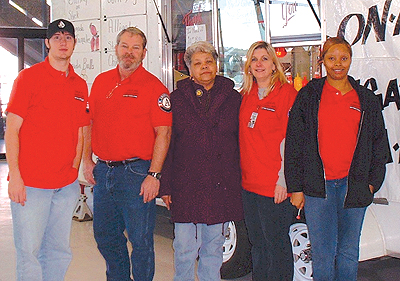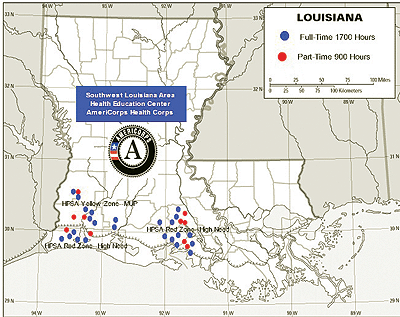Her chances of success looked slim in light of significant funding cuts to the Corporation for National and Community Service’s overall AmeriCorp budget. Out of an original 18 programs in Louisiana, only six had survived the cuts and Dane’s was the only health corps in the entire state. Those cuts were mirrored across the country, and many programs were shut down completely. Dane sent out her grant application, and just in case, she also was sending out resumes. Surprising news followed. Out of more than 500 nationwide applicants, Dane was awarded one of only two or three direct grants given in each state. And the news got better. The corps consists of trained people who are dedicated to helping nonprofits accomplish more and use volunteers more effectively. Dane had applied for 15 full-time members to work with the health corps in Southwest Louisiana. Instead she got 25 full-time and an additional nine part-time members—a grant totaling $400,000. “I attribute my success to my program at Emory,” Dane wrote to RSPH faculty after receiving the grant. “It is important for you to know what a huge impact the Career MPH faculty makes in my life down here in rural Louisiana. There aren’t many people with whom I can collaborate regarding the public health problems here. I feel so lucky to be a part of such a unique program with such supportive faculty.”The grant will help SWLAHEC address community health needs by implementing health promotion and disease prevention projects at established partner sites, participate in health care recruitment planning, coordinate community clinic services delivery, and assist with continuing education for health care professionals. During the past three years, some 6,339 indigent people received access to health-related services through the AmeriCorps program, including primary care, dental, and mental health exams and access to pharmaceuticals. SWLAHEC disseminated health promotion information to another 21,115, including workshops on the effects of tobacco use, pregnancy prevention classes, and a health careers summer camp.
Specifically, the new grant will train members in homeland security and give them a real-life setting in which to participate in civic engagement and understand how American democracy works. “The members live and work in their respective communities and are highly visible as an integral part of the community fabric,” says Dane. “They work on a range of projects, from coordinating pharmaceutical access to running physical activity programs for kids to prevent and reduce obesity or HIV education outreach. They serve in our community clinics for the working uninsured to help people navigate the health care system and even assist with health career exposure programming. My job is to keep the machine running, as well as ensure that all members are trained and understand the importance of service to the communities and what their roles are.” In short, SWLAHEC has become a model for other programs. The Louisiana Serve Commission calls on Dane to train and provide technical assistance to other programs and to peer-review grants. And there is more good news on the horizon for AmeriCorps. The 2004 Omnibus Appropriations Bill designated a historic increase in funding to support 75,000 members—a 20% increase over the tight 2003 budget. By Rhonda Mullen
Disease Detective | Instamatic Informatics | Veteran Epidemiologist | The Human Strain Expelling the Fiery Serpent | Class Notes | Rollins School of Public Health
Copyright © Emory University, 2004. All Rights
Reserved. |


